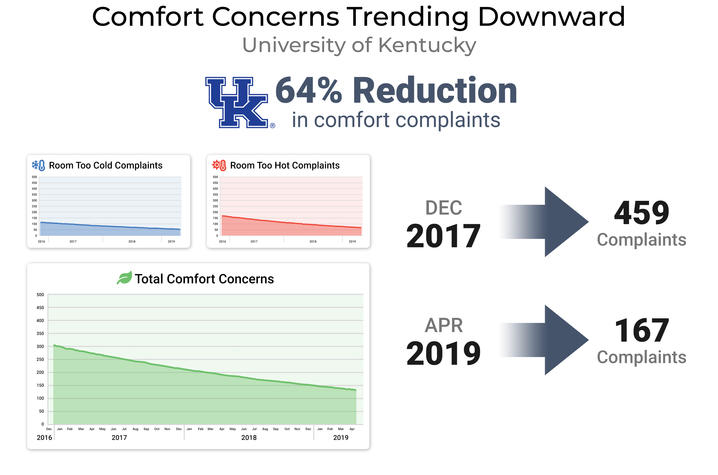With Cenergistic, UK Conserves Energy and Funds
LEXINGTON, KY (June 17, 2019) — The cleanest, most sustainable (and cheapest) energy is the energy we avoid using through efficiency and conservation. In pursuit of these economic and environmental benefits, the University of Kentucky entered into a university-wide, multiyear contract and partnership in 2016 with Cenergistic, a leading energy conservation and sustainability company.
The energy conservation program is part of the university’s utilities master plan obligations and UK's strategy for emissions reduction commitment.
With the help of Cenergistic, UK has been able to implement an energy conservation program with the goals of improving sustainability, reducing energy usage and lowering energy expenses. This partnership also allows UK to draw from a nationwide network of experience and expertise.
The focus of the first two plus years of the partnership has been on the optimization of existing systems and promoting a mindset of conservation to students, faculty and staff. As part of the program, full-time onsite energy specialists worked with UK staff to ensure all facility systems are operating at peak efficiency while also identifying additional opportunities for savings. The teams continually audited each building on campus evaluating items such as building temperatures, light usage, space utilization and occupancy patterns to identify opportunities to conserve energy.
“We’re a couple years into our partnership and the results are impressive. We’re working closely together on the next round of energy conservation measures to augment the savings to date,” said Jeff Zumwalt, executive director of UK Utilities and Energy Management. “It’s important to note that these gains have been achieved while also reducing the number of comfort concerns across campus.”
Comfort concerns on campus are down 64 percent since the start of the program.
Conservation efforts this summer have increased, since the number of individuals on campus has diminished. Examples of conservation efforts include temperature scheduling in buildings and light scheduling in buildings. To put this into perspective, William T. Young Library is open 24 hours, but rather than have the entire building running at full speed all day, only certain areas are illuminated during low occupancy times.
The initiative is yielding positive impacts for both the environment and UK’s energy bills. Thus far, the total cost avoidance attributed to the effort is approximately $12.8 million, accompanied by an overall emissions reduction of 56,767 metric tons of CO2 equivalent. This is equal in impact to removing 11,826 passenger cars from the road for a year, or the carbon captured by 1,455,557 tree seedlings grown for 10 years. Annual net energy reductions of 20 percent or more are expected by the end of the partnership.
“We are thrilled with the opportunity to work with UK to help implement strategies that lower greenhouse gas emissions while enhancing campus operations and reducing long-term energy costs,” said Cenergistic Vice Chairman Randy Hoff. “UK has an amazing culture, dedicated leadership and a strong commitment to sustainability. Our partnership further highlights their stewardship to the environment and their students.”
Members of the campus community can play an important role in helping make UK more sustainable and efficient. It all starts with energy awareness. Something as small as turning off a light when exiting a room can have a huge impact on conservation efforts.







